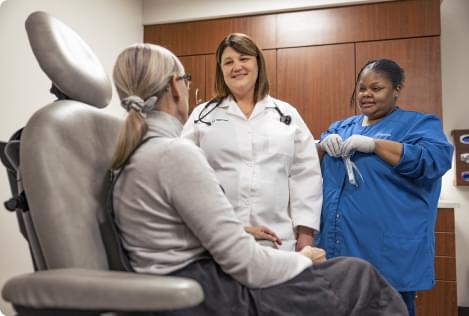Published: November 14, 2023
The end of daylight-saving time earlier this month signaled the start of shorter, darker, often colder days. This may trigger symptoms of seasonal affective disorder, or SAD, which is a condition in which people experience many symptoms often seen in depression but during times of shorter daylight.
“This time of year, getting restful, restorative sleep that rejuvenates us is so important,” says Dylan McKay, D.O., primary care physician with Sparrow Medical Group. “Quality, relaxing sleep has numerous health benefits.”
- Sleep helps control weight gain by balancing hormones that stimulate your appetite. If you do not get enough sleep, your body produces ghrelin, a hormone that boosts hunger, and decreases the production of leptin, a hormone that tells you you’re full.

- Sleep allows our immune cells and proteins to rest in order to fight what comes their way — like colds or the flu. According to sleep specialists at the American Academy of Sleep Medicine, proper sleep can also make vaccines more effective.
- Sleep manages the release of cortisol, also known as our ”fight or flight” hormone. This stress hormone triggers our heart to work harder, potentially leading to heart health problems such as high blood pressure or heart attacks. Much like our immune system, our heart needs rest to function properly and powerfully.
- Sleep provides better concentration, enhanced attention, better problem-solving skills, and improved memory. Quality sleep leads to fewer changes in mood and even encourages brain, heart, lung, muscle, and bone health.
Consider trying out these tips to maximize your sleep habits:
- Keep a routine as much as possible. This includes consistent sleep and waking times.
- Try increasing natural light exposure during the day, especially in the morning. Light plays a key role in regulating our circadian rhythm, also known as our internal clock, signaling us when to be alert and when to rest.
- Try decreasing blue light exposure (such as computers and cell phones) within an hour of going to bed. Blue light fools our brain into thinking it's daytime. When that happens, our body stops releasing a sleep hormone called melatonin.
- Maintain a cooler temperature in your bedroom. Our body's temperature naturally drops as you sleep so a cooler room makes it easier to fall and stay asleep.
- Invest in a comfortable bed, mattress, and pillow to help reduce pressure points and keep the body in a neutral position.
- Embrace relaxation practices, including a hot shower or bath, deep breathing, reading, stretching, or even meditating.
If you feel that you are not getting enough sleep or are having difficulty with sleep issues, be sure to discuss this with your health provider. There are many tools and techniques available to help you sleep well and be at your best.
###
Sparrow is Mid-Michigan’s premier healthcare organization and includes hospitals in Lansing, Carson City, Charlotte, Ionia and St. John, as well as Sparrow Specialty Hospital, Sparrow Care Network, Sparrow Medical Group, the Michigan Athletic Club, and AL!VE. Sparrow is part of University of Michigan Health. Through the dedication of our 10,000 caregivers, Sparrow pursues a vision to be nationally recognized as a leader in quality and patient experience. For more information, Sparrow.org.


